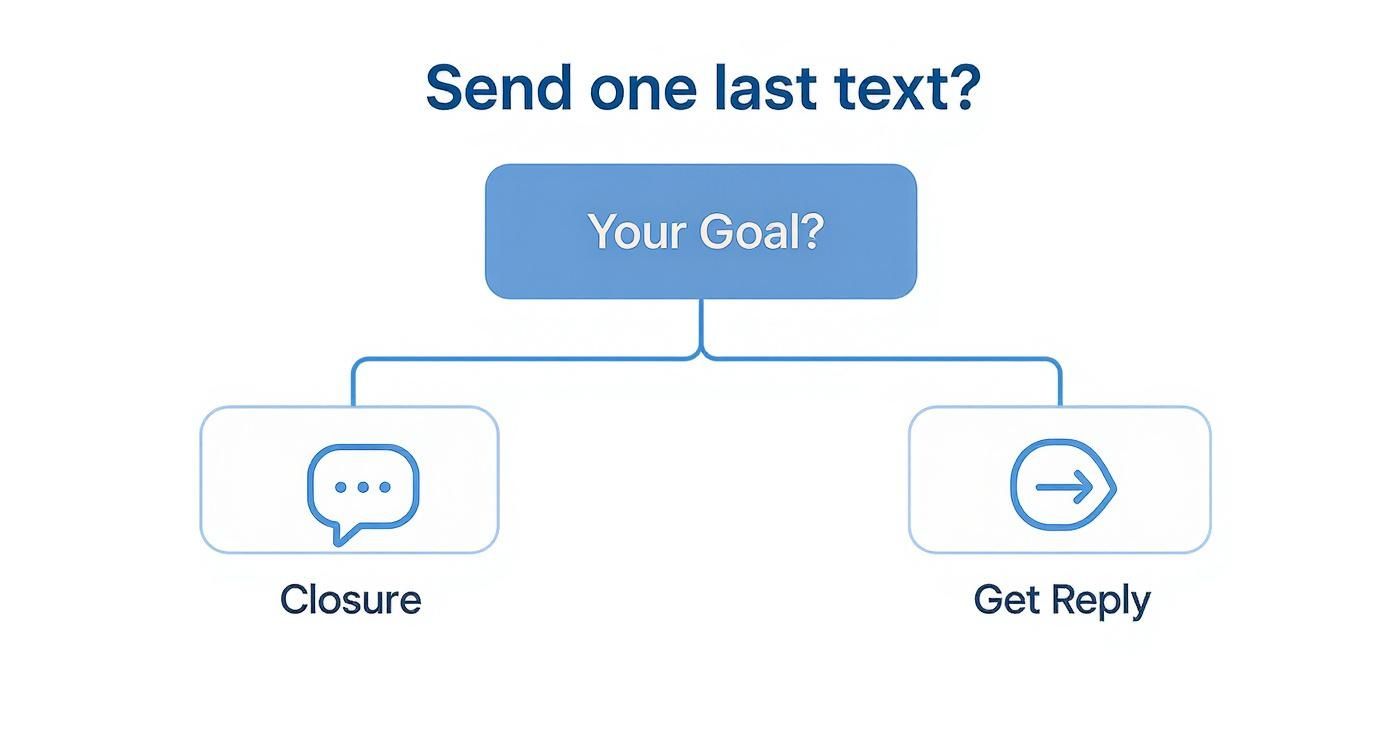Before you even think about what to text (or not text) the person who ghosted you, the first move has nothing to do with them. It’s all about you. The best thing you can do is hit pause, let yourself feel whatever you’re feeling without judgment, and then figure out if reaching out again is truly for your own good. This puts you back in the driver's seat, making sure your next step comes from a place of strength, not hurt.
Why Ghosting Happens and How to Process It

That sudden, deafening silence isn't just an unanswered message. It’s a uniquely confusing and painful kind of rejection that can send your self-doubt into overdrive. Before you do anything else, it's so important to ground yourself and remember this almost never has anything to do with you.
Ghosting is ridiculously common in the world of modern dating. One survey found that a staggering 77% of single men and 72% of single women have been on the receiving end. The reasons usually point back to the ghoster’s poor communication skills. The top culprits? They simply lost interest (54%), saw a dealbreaker they didn’t want to discuss (28%), or were swamped with personal stress (9%).
Acknowledge Your Feelings Without Judgment
It’s completely normal to feel hurt, confused, or just plain angry. The trick is to let those feelings exist without turning them inward and blaming yourself. Ghosting speaks volumes about the other person's emotional maturity (or lack thereof), not your worth. Often, it’s a classic case of conflict avoidance or even a sign of an avoidant attachment style.
If that sounds familiar, you might find some clarity in our guide about https://poke-match.com/do-avoidants-come-back-after-ghosting/.
The worst part about ghosting is the void it creates. Our brains hate a vacuum, so they rush to fill in the blanks, usually with the harshest self-criticism. Your first and most powerful move is to refuse to play that game.
The anxiety that bubbles up in that silence can feel like a tidal wave. Before you decide what to do next, take a moment for some emotional first aid. These simple grounding techniques can help you calm the storm and regain a sense of control, ensuring your next move is for your own closure, not their approval. For a deeper dive, check out these practical tips on How To Handle Anxiety: Practical Tips And Strategies.
Your Emotional First Aid Kit for Ghosting
A few grounding techniques to use before you decide how to respond.
| Action | Why It Helps You Regain Control |
|---|---|
| Deep Breathing | A few slow, deep breaths can calm your nervous system almost instantly, pulling you out of that fight-or-flight panic. |
| The 5-4-3-2-1 Method | Name 5 things you see, 4 you feel, 3 you hear, 2 you smell, and 1 you taste. This yanks your brain out of the anxiety loop. |
| Go For a Walk | Moving your body helps burn off anxious energy and gives you a much-needed change of scenery and perspective. |
| Journal Your Thoughts | Get all the angry, confusing, and sad thoughts out of your head and onto paper. It helps you process without judgment. |
Taking just a few minutes to center yourself is a game-changer. It ensures that whatever you do next, you're doing it for the right reasons—to get the closure you need, not to get a reaction out of them.
Sending One Last Message for Your Own Closure
Sometimes, just letting the silence hang in the air doesn't feel right. Sending one last message isn't about chasing them or begging for an explanation—it's about closing the loop for your own peace of mind. The whole point is to walk away with your head held high, knowing you said what you needed to.
The trick is to frame the message around your own feelings. Using "I" statements is key here, as it keeps the message from sounding accusatory or desperate. You're simply stating your side of things and gracefully shutting the door. It's a move that shows emotional maturity and self-respect, no matter if they reply or not.
What to Say to Maintain Your Dignity
Your message needs to be short, clear, and focused on your experience. You don't need to ask them why or demand anything at all.
Here are a few ways you could phrase it, depending on the situation:
-
For a casual thing (after a few dates):
"Hey, I enjoyed getting to know you, but I'm sensing you've moved on. I'm going to take the silence as your answer. Wish you the best." -
For something more established:
"I'm surprised I haven't heard from you and a bit disappointed by the silence. For my own closure, I'm going to assume you're no longer interested. I wish you well." -
For a direct and confident vibe:
"Hey, it's clear our communication has ended. I'm moving on now but wanted to close the loop. All the best."
Key Takeaway: The power in these messages is their finality. You aren't asking a question. You are making a statement and deciding to move forward on your own terms.
Sending that final, self-respecting text can be a huge step in taking back control of the narrative. It’s a way of telling yourself that your feelings are valid, even when someone else fails to acknowledge them.
If you're looking for more specific phrases, you might want to explore these additional ideas for what to say when someone ignores you on text. In the end, this last message is really a gift you give yourself—the gift of closure.
When No Response Is the Best Response
There are times when the most powerful thing you can say is nothing at all. Choosing silence isn't about giving them the "silent treatment" or playing some kind of game. It’s a deliberate choice to protect your own peace and save your emotional energy for people who actually value you.
Think about it: if someone's actions have already screamed disrespect, chasing them for a reason only hands them more of your power. Their silence is the message. In these moments, the best way to respond to ghosting is to recognize that your dignity is worth more than their half-baked explanation. Stepping back is a profound act of self-respect.
Deciding Your Next Move
When you're stuck in that confusing post-ghosting fog, it’s critical to pause before you type out a message. Get really honest with yourself about what you're trying to achieve. Are you truly looking for closure, or are you just trying to get a reply—any reply—out of them?
This little decision tree can help you get clear on your real motivation.

As you can see, your intention should be your guide. It helps separate the healthy desire to close a chapter for yourself from the often-painful hope of poking them into a response.
The real win isn't getting them to text back. The real win is realizing you don't need them to.
By choosing not to engage, you get to close the door on your own terms. This isn't a passive move; it's you actively deciding to move forward. You might be surprised to learn about the psychology behind why ghosters always come back once they sense you’ve moved on, but your goal should always be your own healing, not baiting them into a return. Prioritize yourself and walk away from a situation that's clearly not serving you anymore.
When Ghosting Happens With Friends and at Work
Ghosting’s icy silence isn't just for dating. That confusing, stinging rejection hits just as hard when a friend suddenly drops off the map or a recruiter vanishes after a fantastic interview.
The thing is, how you handle ghosting in these situations needs a different touch.
In the professional world, getting radio silence from a potential employer is surprisingly normal. In fact, a staggering 61% of job candidates report being ghosted after interviews, a trend that throws a wrench in careers and hiring pipelines. You can get the full scoop on this by reading the full analysis of the 2025 Ghosting Index.
The key here is to keep your cool and respond with a level of professionalism that leaves the door open for whatever might come next.
Navigating Workplace Silence
So, you’ve been ghosted after an interview. The last thing you want to do is send an email that sounds accusatory or desperate. Instead, the goal is to send a polite, brief follow-up that reminds them of your interest without putting them on the spot.
It’s all about positioning yourself as a composed, professional candidate, no matter the outcome.
Here’s an example of a solid professional follow-up:
"Hi [Interviewer's Name], I hope you're having a good week. I'm just checking in on the timeline for the [Job Title] position and wanted to reiterate my interest in the opportunity. Best regards, [Your Name]."
This message works because it’s short, positive, and professional. It’s a gentle nudge that also shows you’re still enthusiastic about the role.
Addressing a Friendship Fade-Out
With friends, the whole situation is far more personal and, frankly, a lot more delicate. A direct but gentle approach usually works best. You want to give them an easy way to re-engage without making them feel cornered or defensive.
Remember, your goal isn't to demand an explanation—it's to open a line of communication.
You could try a low-pressure text like one of these:
- The Gentle Check-In: "Hey, I haven't heard from you in a while and just wanted to check in and see if everything is okay. Thinking of you."
- The Direct but Kind Approach: "I've noticed some distance between us lately and it's left me feeling a bit confused. I really value our friendship and hope we can connect soon."
This approach strikes a nice balance. It acknowledges your need for clarity while also respecting that they might need some space. Most importantly, it clearly communicates that you care about them and the friendship, inviting a conversation instead of forcing one.
Rebuilding Confidence and Setting Future Boundaries

Once you’ve processed the ghosting and decided how (or if) you’ll respond, the next chapter begins. This part is all about you. It’s your chance to spin a frustrating experience into a powerful lesson on self-respect and emotional resilience. Shifting the spotlight back to your life, your ambitions, and your happiness is the ultimate way to take your power back.
This isn’t about building walls around your heart. Think of it more like learning to install a gate with very clear instructions on how it works. Use this experience as a learning opportunity. What did the early days of this connection look like? Were there communication lags, mixed signals, or other small red flags you might have brushed off? Acknowledging those patterns is your first step to sidestepping them in the future.
Learn to Set Clearer Expectations
Setting boundaries is really just about communicating your needs respectfully and seeing who sticks around. You can’t control how other people act, but you absolutely have control over what you accept into your life.
This is especially true in the wild world of online dating. With more than 350 million users worldwide, dating apps have made it easier than ever to meet people, but they’ve also created a lot of gray areas. The sheer volume of matches can sometimes encourage flaky communication, which makes having strong personal boundaries non-negotiable. If you want to feel more prepared, you can discover more insights about modern dating dynamics.
Ghosting is a painful reminder that closure is a gift you give yourself. The best boundary you can set is deciding that your peace is more important than their explanation.
A huge part of this process is learning to trust your gut. If a new connection just feels off or leaves you feeling more anxious than excited, give yourself permission to pull back. You don't need a spreadsheet of evidence to justify protecting your peace.
Practical Boundaries for Healthier Connections
Setting boundaries sounds great in theory, but what does it actually look like day-to-day? Here are a few actionable ways to protect your emotional well-being as you start making new connections.
| Boundary Type | What It Looks Like in Practice |
|---|---|
| Communication Clarity | Being upfront about your style. You might say something like, "Just so you know, I'm more of a texter, but I totally get it if you'll be busy for a few days." |
| Pacing the Connection | Fighting the urge to get emotionally invested on day one. Let their actions and consistency build your trust over time, not just their words. |
| Protecting Your Energy | Limiting time with people who are inconsistent or leave you feeling drained, even if the connection feels promising on the surface. |
Ultimately, this whole process isn't about being guarded—it's about becoming a better gatekeeper for your own heart. You'll start to value consistency over intensity and clear communication over vague promises, building a solid foundation for the healthier, more respectful connections you deserve.
Common Questions About Dealing With Ghosting
When you've been ghosted, your head is probably swimming with "what ifs" and a whole lot of confusion. Getting a handle on how to react in different situations is the key to getting your feet back under you and moving on with your head held high.
How Long Should I Wait Before I Know It’s Ghosting?
This is the big one, isn't it? The tricky part is there’s no magic number. It all comes down to the rhythm of your communication before the silence.
Were you two texting back and forth all day, every day? If so, a sudden silence of three or four days is a pretty strong signal. If your chats were more spread out, maybe you give it a week. Ultimately, you have to trust your gut on this one. When the silence starts to feel less like they're busy and more like they're intentionally gone, it's time to decide what you want to do next.
What If They Come Back?
Ah, the classic "zombie-ing" — when they rise from the dead and slide back into your DMs. If this happens, your response needs to be all about protecting yourself and your boundaries.
It's totally fine to hear them out if you feel like you need that closure. But it's just as valid to straight-up ignore them or send a clear message that you're not interested in picking things back up.
Don't let their convenience trump your emotional well-being. Before you even type out a reply, ask yourself one question: Do I genuinely trust their reasons for coming back, or am I just hoping things will be different?
Is It My Fault I Got Ghosted?
Let's get this straight: No. Ghosting says everything about the other person's communication skills (or lack thereof) and nothing about your worth.
Sure, a little self-reflection after any kind of ending is healthy. We can all learn from our interactions. But taking the blame for someone else’s disrespectful behavior? That’s not productive, and it's not fair to you.
Should I Call Them Out on Social Media?
I get the temptation. It feels like a quick way to get some satisfaction and maybe a little public validation. But trust me on this—it almost always backfires.
Putting them on blast usually just creates more drama and can make it that much harder for you to move on gracefully. The most powerful moves are the ones you make in private, either by sending one final message (if you need to) or by simply choosing not to engage at all. Your healing is so much more important than any public takedown.
At Poke Match, we're here to give you the insights you need to build healthier, more respectful connections. For more expert advice on dating and relationships, check us out at https://poke-match.com.
